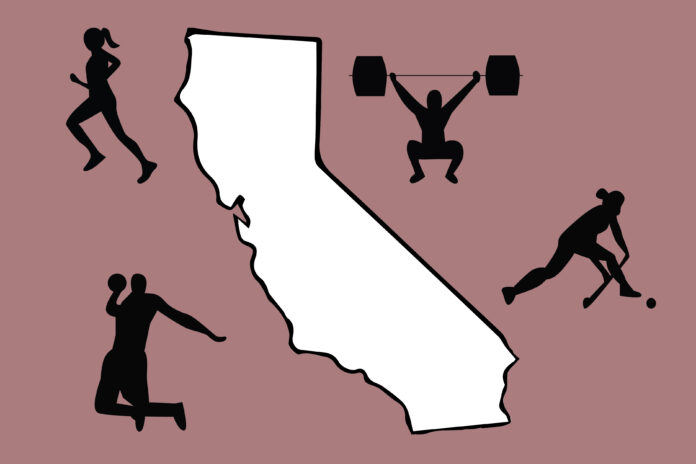The Golden State looks to change college athletics, compensate athletes
California Senate Bill 206, also known as the Fair Pay to Play Act, officially passed the state legislature on Sept. 11, seven months after it was first introduced by State Senator Nancy Skinner (D-9) in February. The bill now awaits Governor Gavin Newsom’s signature — he has until mid-October to sign the bill — and, if he elects not to veto the bill, it would be illegal for universities in California to revoke an athlete’s eligibility and scholarship for taking and making money off of their own likeness.
The bill would also allow these athletes to hire agents that would look for business deals and opportunities. These changes will not take effect until Jan. 1, 2023.
The bill affects the 58 NCAA-member schools in California, including UC Davis. Universities like Stanford and USC have been publicly opposed to this bill. Stanford athletic director Bernard Muir wrote a letter to the California State Senate that expressed his department’s opposition. In the letter, he mentions that the department, “believe[s] that for any reform to be fair and meaningful to all student-athletes it needs to occur at the national level and be adopted by the NCAA.”
The UC Davis athletics department is awaiting a report from an NCAA Working Group on issues relating to student-athlete name, image and likeness before it makes any public comments regarding the bill, according to Eric Bankston, who holds the position of UC Davis assistant athletics director, athletics communications & public relations. The report is expected in October.
Since the bill’s introduction, the NCAA has entrenched itself against SB 206. Back in May of this year, NCAA President Mark Emmert sent a letter to the California Senate, warning that if the bill passes, teams from California schools would be ineligible to compete for championships. While this could have been just a threat to the state to make them drop the bill, under NCAA rules, it would be nearly impossible for this bill to pass and have these schools eligible, which is something that the state would need to consider. The NCAA also argues that the bill would create an advantage for the California schools, as this could shift the tide of recruits that were going elsewhere to try and make some money off of their talent.
The Fair Pay to Play Act has gained major supporters like Democratic presidential candidate Bernie Sanders and the socially active NBA superstar Lebron James. James has been very critical of the NCAA in the past and took to Twitter to voice his support for the potentially groundbreaking bill.
“Everyone is (sic) California- call your politicians and tell them to support SB 206! This law is a GAME CHANGER. College athletes can responsibly get paid for what they do and the billions they create.” James tweeted.
Conversely, Washington State football head coach Mike Leach recently told the media that California should focus on “keeping the streets clean” instead of the bill. And former Heisman Trophy winner Tim Tebow also underwent heavy scrutiny as he claimed this bill is undermining what makes college sports different.
“I knew to go to Florida, my dream school, where I wanted to go, the passion for it and if I could support my team, support my college, support my university, that’s what it’s all about,” Tebow said on ESPN’s First Take. “But now, we’re changing it from ‘us,’ from ‘we, from ‘my university,’ from being an alumni where I care, which makes college football and college sports special, to then ‘OK, it’s not about us. It’s not about we, it’s just about me,”
The argument can be made by either side, but the fact of the matter is that the NCAA and many of its member schools have profited significantly off the talents of amateur student athletes. Sadly, some suffer life-threatening injuries that they will never recover from, forever altering their lives for something that they never got paid for. Many lawsuits have been filed, but none have gained significant traction.
A single signature from the Governor could forever change collegiate sports, and states like South Carolina and New York have begun the process of a similar bill. If passed in California and other states, it could force the hand of NCAA to eventually fundamentally alter their rules.
What is at stake here is something bigger than sports and regardless of the outcome, we could be seeing the start of a massive shift in the NCAA.
Written by: Omar Navarro — sports@theaggie.org









